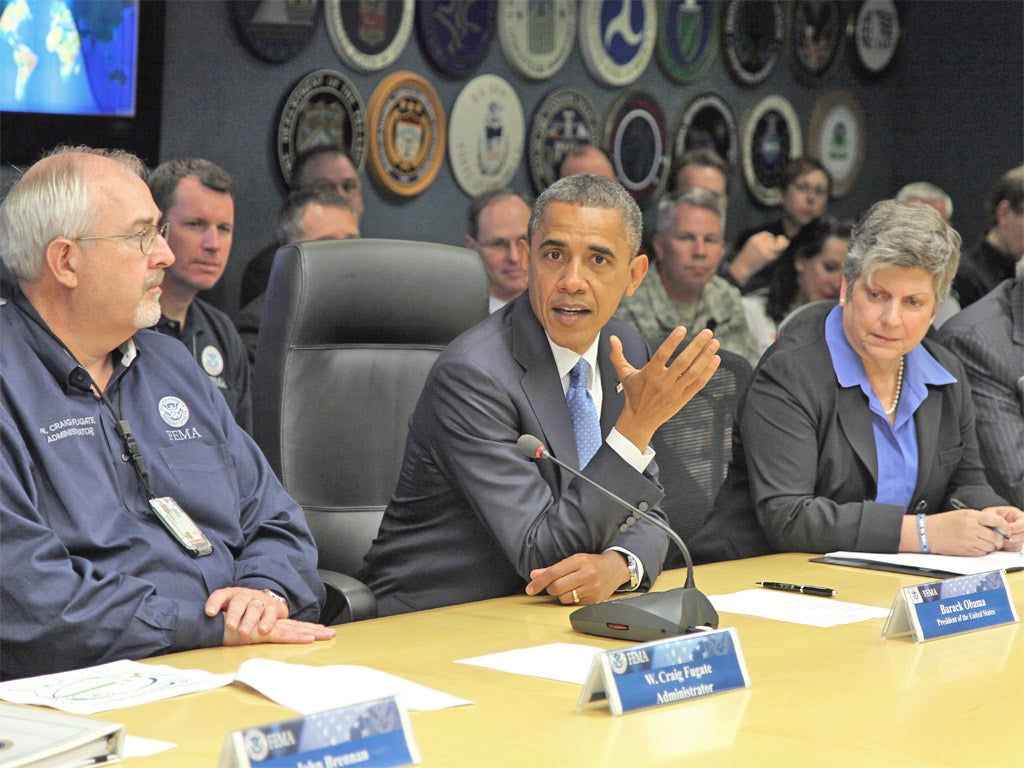The battle for the 'other' House hots up
The race for the White House is too close to call, but control of Congress's lower house is just as tight – and will decide how much power the victor wields

In a year when the White House is at stake, the battle for Congress is the undercard. But it matters, a lot. A President Mitt Romney would need Republicans to gain control of both the House of Representatives and the Senate to push through his promises of an across-the-board tax cut and the repeal of Obamacare. Right now, the odds are he won't manage it.
The House, re-elected in its entirety every two years, is not the problem. Even defiant party loyalists admit Democratic hopes of recapturing the 435-seat chamber, in which the Republicans emerged with a majority of 242 to 193 after the mid-term tsunami of 2010, have virtually evaporated.
Today, thanks to repeated rounds of gerrymandering that have made incumbents safer, and the shrinking of the political centre, less than a quarter of all House districts are in any sense competitive.
Analysts predict Democrats will make a net gain of a dozen seats at most, well short of the "Drive to 25" game plan of Nancy Pelosi, the Minority Leader. There are intriguing individual races, not least the one in Utah's fourth district, where Mia Love – Haitian-American, converted Mormon and mayor of the town of Saratoga Springs – seeks to become the first black Republican Congresswoman.
But the overall picture will almost certainly remain the same: a Republican majority of social and fiscal conservatives, in which moderates are all but extinct, led by a Speaker, John Boehner, with the thankless task of shepherding a rambunctious Tea Party contingent averse to compromise.
If Mr Obama is re-elected, he will therefore have to cope with divided government. Just how divided depends on what happens to the Senate, and there the prospects for Mr Romney's party are murkier.
In the outgoing 112th Congress, Democrats held a slender Senate edge, of 53 to 47. As usual, a third of the chamber's 100 seats are up for re-election in 2012 – and the starting arithmetic distinctly favoured Republicans, who were defending just 10 seats compared to their opponents' 23.
Four or five GOP pick-ups have been likely from the outset of the campaign. But a combination of unexpected Democratic strength in several toss-up contests, a couple of candidates' own goals in seats the Republicans would expect to win, and plain old bad luck, have made the push to the magic number of 51 seriously complicated.
Precisely how complicated hinges on the outcome of the presidential race. If Mr Obama gains a second term, Republicans need a net gain of four. But that figure drops to three should Mr Romney prevail. A 50-50 tie would suffice, given the decisive vote of vice-president Paul Ryan in his constitutional role as president of the Senate.
And Mr Romney's performance may affect the outcome not only directly, but indirectly too. The final outcome, according to analysts, depends on eight or nine especially close races – three (in Virginia, Nevada and Wisconsin) in states which will decide the battle for the White House. If Mr Romney does well in them, his "coattails" could haul the Republican Senate candidate to victory as well.
Right now the omens are mixed. In Virginia, the battle of two former governors, the Democrat Tim Kaine and Republican George Allen, is tilting towards the former. Mr Allen, who once held the seat and presidential aspirations of his own, wants to make amends for his blunder of 2006 when he was caught on camera at a rally using the racial slur "makaka".
In Wisconsin, the popular former Republican governor Tommy Thompson was clear favourite before an unexpectedly bruising primary battle depleted his resources. Right now his opponent, the Democratic Congresswoman Tammy Baldwin, is ahead by a whisker. In Nevada, it is Republican Dean Heller who has a tiny advantage.
Elsewhere several Democrats are doing better than expected, among them the incumbents Bill Nelson in Florida and Sherrod Brown in Ohio, both states where the presidential race is neck-and-neck but where they have established near double-digit leads. And in Nebraska, scene of one of the most fascinating undercard contests, old Democratic lion Bob Kerrey, a presidential candidate in 1992, is fast catching up in his underdog fight to recapture the seat.
But the highest-profile race of all, fittingly, is in Massachusetts. The Republican Scott Brown's 2010 win in the seat held for nearly half a century by Ted Kennedy cost Democrats their filibuster-proof Senate majority of 60, and was portent of the Republican tidal wave that November.
Now Mr Brown is in the fight of his life against Elizabeth Warren, a Harvard professor and celebrated consumer champion, whom some suspect of presidential aspirations of her own should she win. Polls suggest she may.
Gaffes meanwhile on the abortion issue have damaged two other once-favoured Republicans. In Missouri, Todd Akin – he of the "legitimate rape" comment – is trailing the Democratic incumbent, Claire McCaskill. In Indiana, Richard Mourdock's comment that pregnancies arising from rape are "God's will" suddenly threatens to cost Republicans a seat they've held for 36 years.
God's will, of course, can also be sheer bad luck. Few expected Olympia Snowe, one of the few Republican Senate moderates, to resign her seat in Maine in disgust at a deadlocked, hyperpartisan Congress. She is likely to be replaced by Angus King, a former governor and nominal independent, who will probably side with the Democrats. If so, then Ms Snowe may have handed not only her seat, but the whole Senate, to the Democrats.
Join our commenting forum
Join thought-provoking conversations, follow other Independent readers and see their replies
Comments